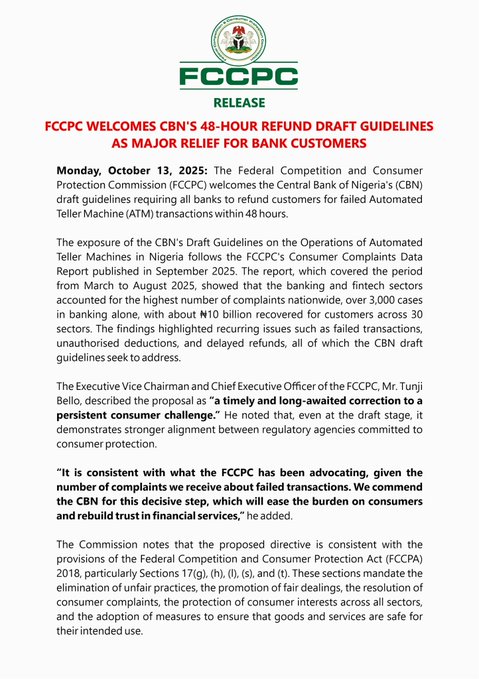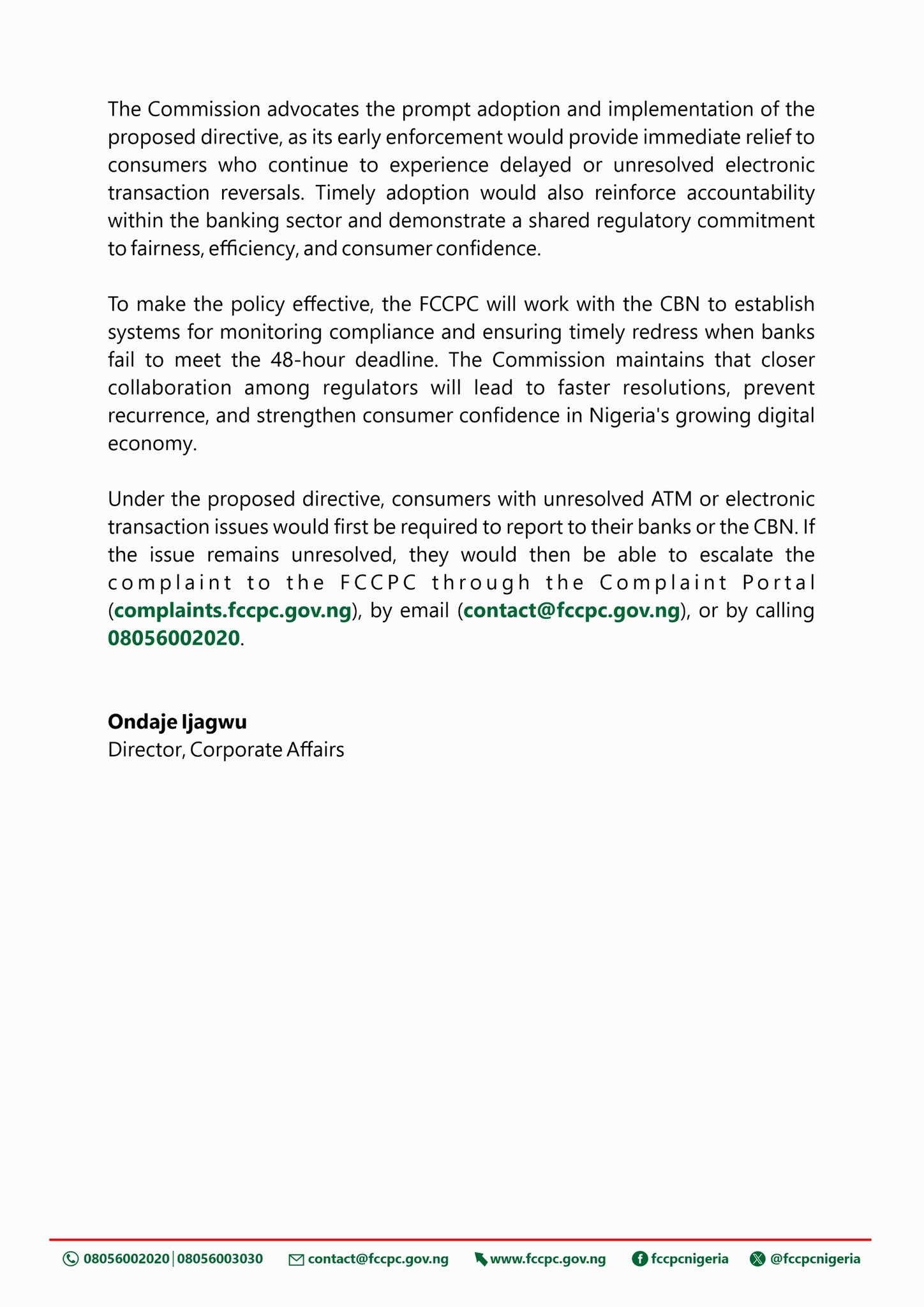The Federal Competition and Consumer Protection Commission (FCCPC) has expressed support for the Central Bank of Nigeria’s (CBN) new draft guidelines requiring banks to refund customers for failed Automated Teller Machine (ATM) transactions within 48 hours.
FCCPC’s Director of Corporate Affairs, Ondaje Ijagwu, announced the commission’s position in a statement issued on Monday.
Ijagwu explained that the CBN’s policy aligns with findings from the FCCPC’s Consumer Complaints Data Report, released in September, which revealed ongoing issues with delayed or unresolved failed transactions in the banking sector.
According to the report, over 3,000 complaints were recorded in the banking industry within six months, leading to the recovery of more than ₦10 billion for consumers across 30 sectors.
The statement also quoted the FCCPC Vice Chairman, Tunji Bello, who described the CBN’s directive as “a timely and long-awaited correction to a persistent consumer challenge.”
The statement reads: “The Federal Competition and Consumer Protection Commission (FCCPC) welcomes the Central Bank of Nigeria’s (CBN) draft guidelines requiring all banks to refund customers for failed Automated Teller Machine (ATM) transactions within 48 hours.
“The exposure of the CBN’s Draft Guidelines on the Operations of Automated Teller Machines in Nigeria follows the FCCPC’s Consumer Complaints Data Report published in September 2025. The report, which covered the period from March to August 2025, showed that the banking and fintech sectors accounted for the highest number of complaints nationwide, over 3,000 cases in banking alone, with about ₦10 billion recovered for customers across 30 sectors. The findings highlighted recurring issues such as failed transactions, unauthorised deductions, and delayed refunds, all of which the CBN draft guidelines seek to address.
READ ALSO: CBN Eases Interest Rate to 27%, Lowers CRR For Banks
Read Also
“The Executive Vice Chairman and Chief Executive Officer of the FCCPC, Mr. Tunji Bello, described the proposal as “a timely and long-awaited correction to a persistent consumer challenge.” He noted that, even at the draft stage, it demonstrates stronger alignment between regulatory agencies committed to consumer protection.
“ ‘It is consistent with what the FCCPC has been advocating, given the number of complaints we receive about failed transactions. We commend the CBN for this decisive step, which will ease the burden on consumers and rebuild trust in financial services,’ he added.

“The Commission notes that the proposed directive is consistent with the provisions of the Federal Competition and Consumer Protection Act (FCCPA) 2018, particularly Sections 17(g), (h), (l), (s), and (t). These sections mandate the elimination of unfair practices, the promotion of fair dealings, the resolution of consumer complaints, the protection of consumer interests across all sectors, and the adoption of measures to ensure that goods and services are safe for their intended use.
“The Commission advocates the prompt adoption and implementation of the proposed directive, as its early enforcement would provide immediate relief to consumers who continue to experience delayed or unresolved electronic transaction reversals. Timely adoption would also reinforce accountability within the banking sector and demonstrate a shared regulatory commitment to fairness, efficiency, and consumer confidence.
“To make the policy effective, the FCCPC will work with the CBN to establish systems for monitoring compliance and ensuring timely redress when banks fail to meet the 48-hour deadline. The Commission maintains that closer collaboration among regulators will lead to faster resolutions, prevent recurrence, and strengthen consumer confidence in Nigeria’s growing digital economy.
“Under the proposed directive, consumers with unresolved ATM or electronic transaction issues would first be required to report to their banks or the CBN. If the issue remains unresolved, they would then be able to escalate the complaint to the FCCPC through the Complaint Portal (http://complaints.fccpc.gov.ng), by email (contact@fccpc.gov.ng), or by calling 0805 600 2020.”






